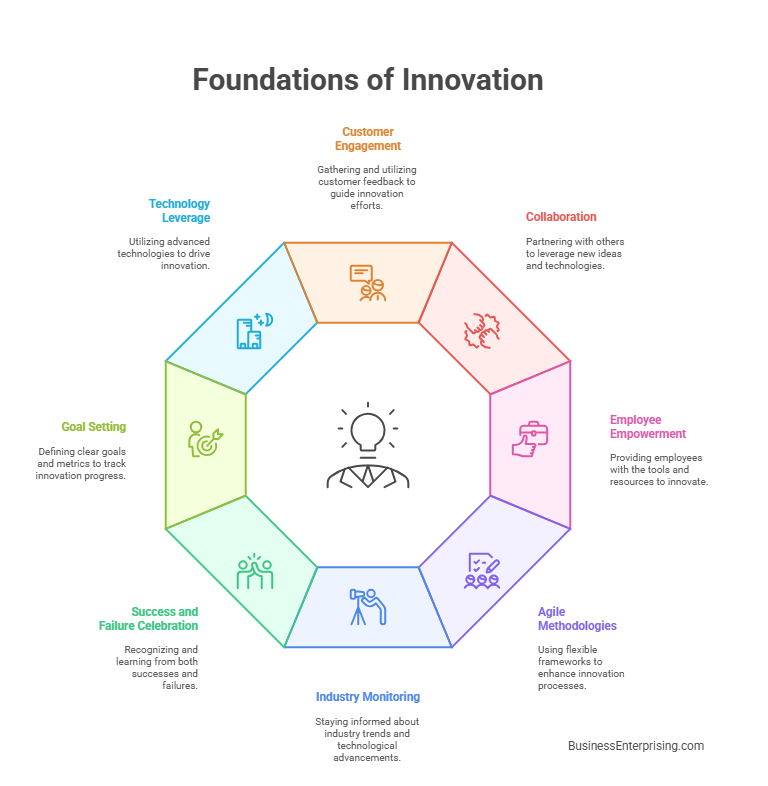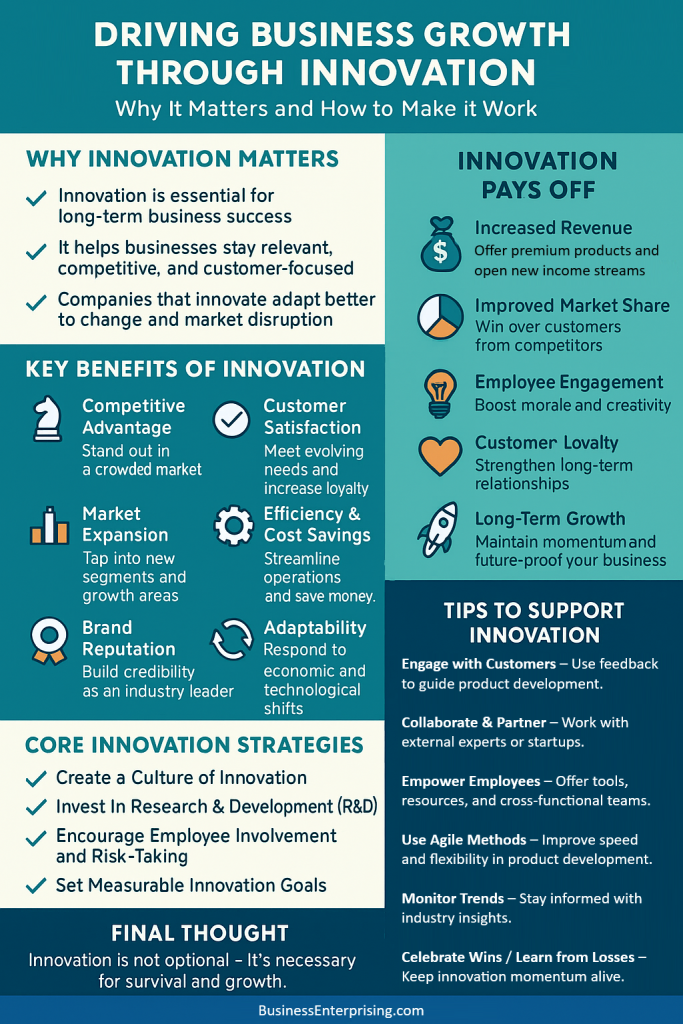
The Importance of Innovation
Innovation drives success for several key reasons:
Competitive Advantage: In today’s global marketplace, companies face intense competition. Businesses that develop innovative products or services stand out, attract more customers, and build stronger defenses against competitors.
Customer Satisfaction: Consumers constantly change their preferences and needs. Businesses that create innovative solutions respond more effectively, improve customer satisfaction, and strengthen loyalty.
Market Expansion: Businesses that innovate can enter new markets and seize fresh opportunities. By introducing unique products or services, they reach untapped segments and fuel growth and diversification.
Efficiency and Cost Savings: Innovation goes beyond new products. Businesses that improve processes and operations with advanced technologies reduce costs and increase efficiency.
Brand Reputation: Businesses that lead with innovation earn reputations as industry leaders. This positive image draws top talent, investors, and customers, boosting the company’s market position.
Adaptability and Resilience: Innovation helps companies adapt in a rapidly changing environment. Businesses that prioritize innovation respond faster to disruptions, adopt new technologies, and adjust to economic changes more effectively.
Benefits of Developing Cutting-Edge Products and Services
Developing innovative products and services offers several powerful benefits that contribute directly to long-term business growth. Companies that prioritize innovation can open new revenue streams, command premium pricing, and strengthen customer retention by meeting evolving needs more effectively than competitors. Additionally, developing innovative products and services enhances brand reputation, helping businesses stand out in crowded markets and attract new customers. This forward-thinking approach also encourages internal engagement, as employees feel more motivated when they contribute to meaningful, high-impact work. Over time, innovation supports increased market share, deeper customer loyalty, and greater adaptability in a rapidly changing business environment.
Increased Revenue: To begin with, new and unique products or services open additional revenue streams. As a result, innovative businesses can charge premium prices, attract new customers, and encourage repeat purchases, thereby strengthening their financial position.
Enhanced Customer Loyalty: Furthermore, businesses that offer cutting-edge solutions increase customer loyalty. Because customers value companies that anticipate their needs and deliver fresh, relevant offerings, these companies develop stronger, long-term relationships with their client base.
Improved Market Share: In addition, innovative companies often expand their market share by reaching broader audiences. By offering more relevant or higher-quality products and services, they attract customers from competitors and strengthen their market position.
Employee Engagement: Moreover, businesses that promote innovation tend to boost employee morale and engagement. When employees work in a forward-thinking environment, they feel more motivated, take greater initiative, and contribute more actively to organizational growth.
Long-Term Growth: Consequently, businesses that consistently prioritize innovation drive long-term growth. They adapt to market trends, remain competitive, and continue to evolve as customer expectations and technologies change.
Strategies for Fostering Innovation
Create a Culture of Innovation: First and foremost, encourage employees to share ideas and take calculated risks. By recognizing and rewarding innovation, you create a culture that supports creativity and continuous improvement.
Invest in Research and Development (R&D): Additionally, dedicate time and resources to exploring new technologies, materials, and methods. Regularly reviewing and expanding R&D efforts helps your business stay ahead of competitors and industry shifts.
Tips for Innovation
Engage with Customers: First and foremost, customer feedback plays a vital role in driving innovation. Therefore, engage with your customers through surveys, focus groups, and social media to better understand their needs and pain points. Then, use this information to shape and prioritize your innovation efforts.
Collaborate and Partner: In addition to internal efforts, innovation often benefits from external collaboration. For this reason, partner with other businesses, research institutions, or startups to access new ideas and technologies. As a result, collaboration brings fresh perspectives and can significantly accelerate your innovation process.
Empower Employees: Furthermore, empowering your employees supports a strong culture of innovation. Provide them with the tools, resources, and training they need to contribute effectively. For example, encourage cross-functional teams to work together, which fosters diverse thinking and creative problem-solving.
Adopt Agile Methodologies: To improve your processes, adopt agile methodologies such as Scrum or Kanban. These frameworks promote flexibility and iterative development. In turn, they enable faster adjustments and support continuous improvement throughout your innovation pipeline.
Monitor Industry Trends: Additionally, stay informed about current industry trends, emerging technologies, and shifting market conditions. Regularly review reports, attend conferences, and follow thought leaders to keep your strategies aligned with market expectations.
Celebrate Successes and Failures: At the same time, recognize that both successes and failures contribute to progress. Celebrate achievements to motivate your team. Similarly, treat failures as learning opportunities to support future innovation.
Set Clear Goals and Metrics: To stay on course, define clear innovation goals and track your progress using measurable metrics. This approach helps you refine your strategy and communicate results effectively to stakeholders.
Leverage Technology: Finally, take advantage of advanced technologies such as AI, big data, and the Internet of Things. These tools offer new possibilities for product development, process efficiency, and deeper customer engagement.
Conclusion
As has been noted above, innovation is a critical driver of business success in today’s fast-paced, competitive market. In other words, developing innovative products and services enables businesses to differentiate themselves, meet evolving customer needs, and achieve sustainable growth. By fostering a culture of innovation, investing in R&D, engaging with customers, and leveraging technology, businesses can maintain a competitive edge and secure their long-term future.
In an era where change is the only constant, innovation is not just about staying ahead—it’s about staying relevant. In summary, companies that prioritize and systematically approach innovation are better positioned to navigate uncertainties, capitalize on new opportunities, and continue thriving in the ever-changing business landscape. By embracing innovation, businesses can turn challenges into opportunities and drive forward with confidence and resilience.


